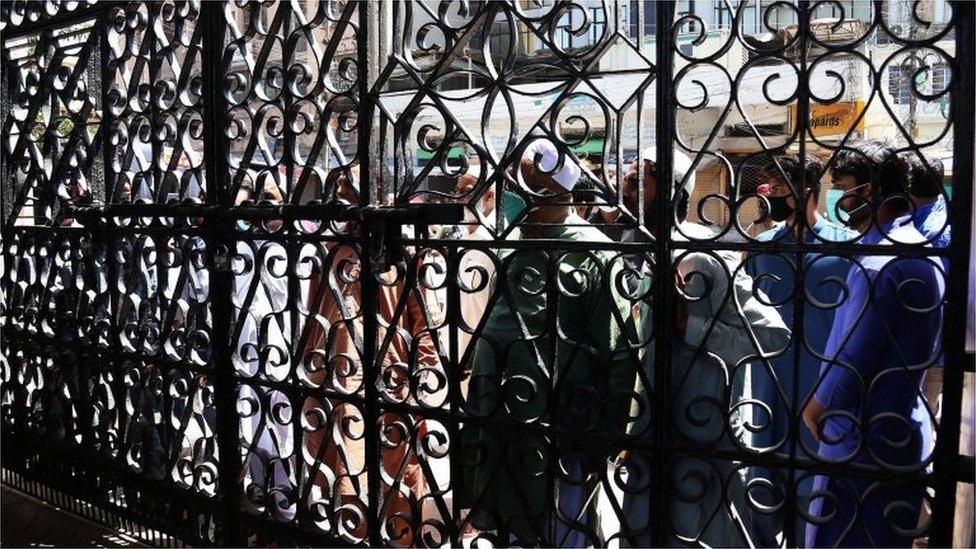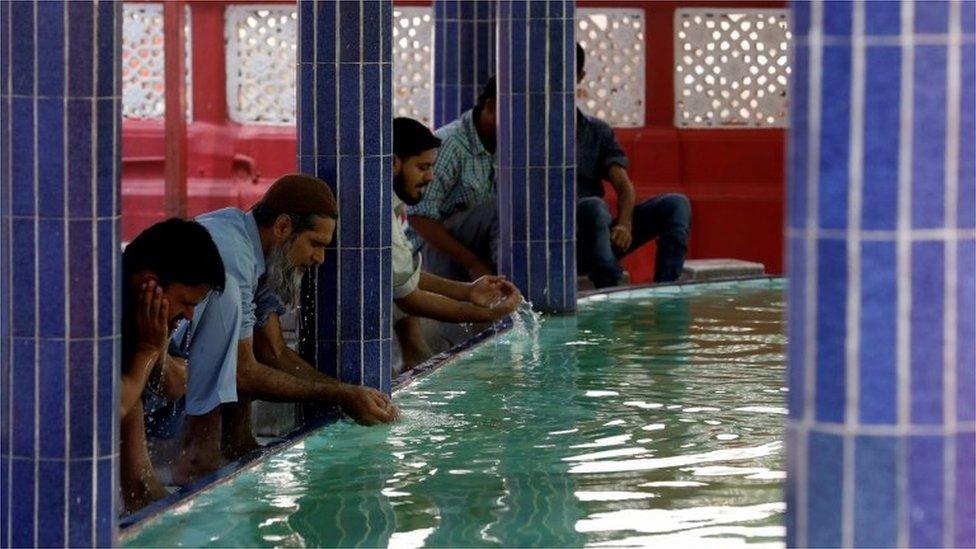Coronavirus updates: Pakistan imposes curfew to curtail Friday prayers
- Published

Last week some people came to mosques to offer prayers despite warnings not to
Pakistan's second largest province has imposed a three-hour curfew-like lockdown to stop people from attending Friday congregational prayers.
Sindh has the country's largest urban population, and therefore remains most vulnerable to social transmission of coronavirus.
Last Friday, scores went to mosques to pray, despite government warnings not to.
Pakistan has the most virus cases in South Asia.
In several Muslim countries it is seen as a religious obligation for men to attend Friday prayers where they often use communal prayer mats, shake hands and pray in close proximity. Women, children, the sick or disabled are not obliged to attend.
Sindh had already announced a lockdown more than a week ago. At that time Prime Minister Imran Khan had publicly opposed the measure saying it would cause people to die of hunger.
The latest measure is intended to shut down all movement during the Friday prayer hours - 1200 to 1500 - and for all markets to close completely during this period, unlike the routine lockdown which allows necessary movements and essential services to continue.
A general order last week to restrict attendance at mosques to a maximum of five persons, including the prayer leader, was largely ignored by people, though attendance at mosques did go down considerably due to a general fear of infection.

But there is pressure on the authorities to do more to restrict public gatherings as the numbers of people testing positive to Covid-19 continue to rise.
According to latest statistics reported by the government, there are at least 2,450 coronavirus infected people across the country.
Sindh accounts for 783 of these cases. In its second largest city, Hyderabad, the number of infected people jumped from four to 130 in just five days.
Many of these cases were found among members of an Islamic missionary movement called Tablighi Jamaat who had returned after attending the Jamaat's annual convention in Lahore in mid-March.
The convention was attended by missionaries from all over the Islamic world. It proved to be a catalyst for the spread of virus to many areas in Punjab, in some sectors of the federal capital Islamabad, as well as to other areas like the Palestinian territories.
This has triggered concerns about religious gatherings in general and congregational prayers at mosques in particular.
As such, while the federal government appears to have taken a back seat on the issue, the provinces have gone ahead and implemented partial lockdowns in their respective jurisdictions, though many say an across-the-board enforcement of these lockdowns remains beyond the capacity of the state.
Early reports suggest the curfew-like situation in Sindh's urban areas has restricted movement and reduced attendance in mosques this afternoon.
The effects of this move will also be felt elsewhere.

A SIMPLE GUIDE: What are the symptoms?
US v ITALY v CHINA: How do death rates compare?
LEADING THE WAY: The US governor who saw it coming early
ON FRONTLINE: 'Nurses prepare for the worst but not this'
REASON TO HOPE: The good that may come out of this crisis

In Islamabad, for example, as the time for Friday prayers approaches, announcements are being made from mosque loudspeakers urging people not to come to the mosque and to pray at home.
In rural areas, however, people will most certainly attend the usual Friday congregations, though their numbers may be far less.
For these people, Friday prayers are more of a social habit than a religious obligation, and many will find it hard to shake it off unless they could see a clear and present danger.